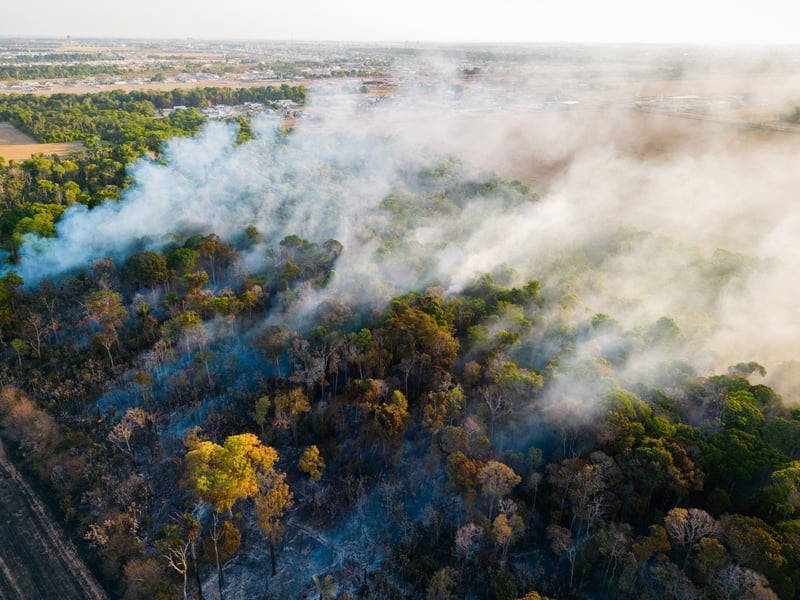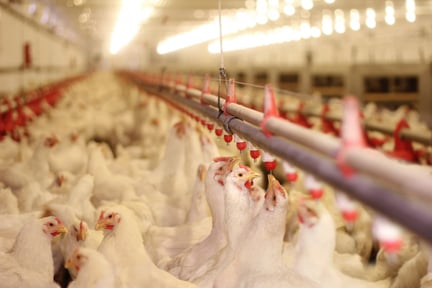
European Green Deal under threat: global calls for retaining the Deforestation Regulation
Press release
Animal protection organisations from the EU and across the world are calling on EU Member States to reverse the European Parliament's recent vote to delay and amend the Deforestation Regulation, a cornerstone of the EU’s Green Deal.
As the legislation heads back to negotiations between the European Parliament and the Council, Eurogroup for Animals and World Animal Protection urge Member States to reject the "no-risk" category. Not only does it undermine the regulation's ability to help ensure an end to global deforestation, but it also risks discrimination claims from partner countries, potentially jeopardising the regulation's standing at the WTO.
Ambassadors from the EU member states will meet on Wednesday to discuss how to respond to the Parliament's vote. Originally, this regulation sought to prevent products that contribute most to deforestation, such as beef, leather, and soy for animal feed, from being marketed on the EU market without strict compliance checks. The regulation provided a robust framework to ensure these products do not contribute to forest destruction, both within the EU and beyond. This had given hope to activists from across the world that Europe could make a real contribution to ending deforestation globally.
The EP's decision to introduce a "no-risk" category [1] for certain countries of production, the regulation would allow for checks on a mere 0.1% of operators in this category, effectively exempting mostly EU-based operators from meaningful scrutiny. This new category is expected to apply primarily to EU Member States, raising serious concerns about double standards and potentially exposing the regulation to challenges within the WTO.
'The regulation as initially agreed discouraged the placement in the EU of intensive and unsustainable animal products that contribute to deforestation. To truly protect animals, people and the planet, the EU should stick to the initial text, said Stephanie Ghislain, Political Affairs Manager, Eurogroup for Animals.
'We were disappointed to see that the European Parliament has reduced the scope of the Deforestation Regulation. We see this Regulation as one of the most impactful pieces of legislation in stopping deforestation across the world. Australia is a global deforestation hotspot, losing hundreds of thousands of hectares annually. This destruction kills millions of endangered native animals, including iconic species such as koalas. We hope that Australia will not be excluded from the scope of the Regulation because it may fall in the so-called 'no risk' category,' Ben Pearson, Country Director, World Animal Protection, Australia added.
The EP also agreed to delay the regulation's implementation by 12 months as originally proposed by the European Commission and alreadyaccepted by Member States. This decision arrives at a critical juncture, as the EU seeks to conclude negotiations on the EU-Mercosur trade deal. This is worrying as the deal, in its current form, would exacerbate deforestation and enable cruel conditions for animals on intensive farms in Mercosur countries. The delay, supposedly agreed to give operators additional time to adjust, overlooks those who have proactively prepared for the regulation's original January 2025 start date, nearly two years after its announcement.
With this regulation at a crucial crossroads, the EU must reaffirm its commitment to sustainable production practices, resisting measures that would weaken its efficacy or betray the Green Deal's core objectives as highlighted by' 225 organisations across 42 countries.
ENDS
Notes:
[1] A key feature of the initial regulation was the classification of production countries into three risk categories: high, standard, and low. Checks were mandated according to these risk levels, with 9% for high-risk countries, 3% for standard-risk, and 1% for low-risk, ensuring consistent compliance monitoring. By acknowledging varying levels of deforestation risk, this three-tier system reinforced that all product origins carry some degree of environmental impact.
Press contacts
Theresa Bonnici, Press Officer, Eurogroup for Animals
t.bonnici@eurogroupforanimals.org
+32 (0) 456 42 11 99
David Garrahy, External Affairs Manager, World Animal Protection
davidgarrahy@worldanimalprotection.org
+32(0)470 18 44 87
Eurogroup for Animals represents over ninety animal protection organisations in almost all EU Member States, the UK, Switzerland, Serbia, Norway, Montenegro, Bosnia & Herzegovina, Brazil, Canada, India, Kenya, South Africa, Thailand, Ukraine, United States, Venezuela and Australia. Since its foundation in 1980, the organisation has succeeded in encouraging the EU to adopt higher legal standards for animal protection. Eurogroup for Animals reflects public opinion through its members and has both the scientific and technical expertise to provide authoritative advice on issues relating to animal protection. Eurogroup for Animals is a founding member of the World Federation for Animals which unites the animal protection movement at the global level.
World Animal Protection is the global voice for animal welfare, with more than 70 years' experience campaigning for a world where animals live free from cruelty and suffering. It works to protect animals that play a vital role in solving the climate emergency, the public health crisis, and the devastation of natural habitats. World Animal Protection works across 47 countries, working to end animal cruelty and suffering for both wild and farmed animals.
